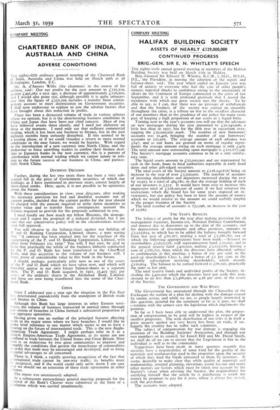CHARTERED BANK OF INDIA, AUSTRALIA AND CHINA
ADVERSE CONDITIONS
THE eighty-fifth ordinary general meeting of the Chartered Bank of India, Australia and China was held on March 29th at 38 Bishopsgate, London, E.C.
Mr. A. d'Anyers Willis (the chairman) in the course of his address, said: Our net profits for the year amount to £335,309, against £491,065 a year ago, a decrease of approximately £156,000, and I would also point out, although possibly it is quite onneces- sary that the figure of £335,309 includes a transfer from contin- gencies account to meet depreciation on Government securities. I shall now endeavour to explain to you the adverse factors that have brought about this reduction in profits.
There has been a decreased volume of trade in various spheres there we operate, but it is the deteriorating business conditions in China and Japan that have been our chief concern. Most of you have followed events there closely, and I need not elaborate on these at the moment. I need only say that ordinary commercial trading, which it has been our business to finance? has in the past eighteen months been seriously disturbed. If this seemed to be a passing phase, or if we could visualise a return to more normal conditions in the near future, we would be happier. With regard to the introduction of a new currency into North China, and the endeavour to force unwilling traders to confine their finance deal- ings to Japanese banks in the new currency, this is a portent of interference with normal trading which we cannot ignore in rela- tion to the future success of our business in China, and particu- larly North China.
DIVIDEND DECISION
Further, during the last two years there has been a very sub- stantial fall in the price of Government securities, of which our holdings, as I have mentioned in previous years, consist largely of short-dated stocks. Here, again, it is not possible to be optimistic about the future.
With these considerations in view, your directors, after making the necessary provision for bad and doubtful accounts out of current profits, decided that the current profits for the year should be charged with the amount required to write down securities to market value and to transfer from contingencies account the balance required to provide for the proposals submitted to you. I need hardly say how much my fellow Ithectors, the manage- ment and I regret the proposal of a reduced dividend, but I am sure that ow conservative policy will in the circumstances receive our full approval.
You will observe in the balance-sheet against our holding of I'. and 0. Banking Corporation, Limited, shares, a note stating that " A contract has been entered into for the purchase of the undertaking of the P. and 0. Banking Corporation, Limited, with effect from February 1st, 1939." You will, I feel sure, be glad to learn that practically the whole of the business hitherto conducted by the P. and 0. Bank has been transferred to the Charttred Bank, and this accretion to the volume of our business will, I hope, prove of considerable value to this bank in the future.
I should, perhaps, particularly refer now to one of the assets of the P and 0. Bank which we have taken over, and which will hereafter appear in our own future balance-sheets as a separate item. The P. and 0. Bank acquired, in 1921, 23,403 (93i per cent.) of the ordinary shares in the Allahabad Bank, Limited, and these are now being transferred into the name of the Char- tered Bank.
CHINA
Since I addressed you a year ago the situation in the Far East has deteriorated considerably from the standpoint of British trade and finance in China.
Although this Bank has large interests in other Eastern terri- tories, the volume of business transacted in normal times through our system of branches in China formed a substantial proportion of cur aggregate operations.
Having given you an outline of the principal features affecting trade in the major zones where we have branches, I would like to make brief reference to one matter which seems to me to have a hearing on the future of international trade. This is the new Anglo- American Trade Agreement. I might perhaps refer to it as a British Empire-American Trade Agreement, as its terms are not confined to trade between the United States and Great Britain. Now here is an endeavour by two great communities to improve and simplify the conditions that govern the interchange of commodities order that trade may be encouraged and developed, and so bring material advantages to all concerned.
There is, I think, a rapidly growing recognition of the fact that r.ternational trade cannot be one-way traffic; its benefits must be reciprocal, and if the world could only settle down I am sure teat we should see an extension of these trade agreements in other ,pheres.
The report was unanimously adopted.
At a subsequent extraordinary general meeting proposals for the r'newal of the Bank's Charter were submitted in the form of a risolution which was carried unanimously.


































































 Previous page
Previous page